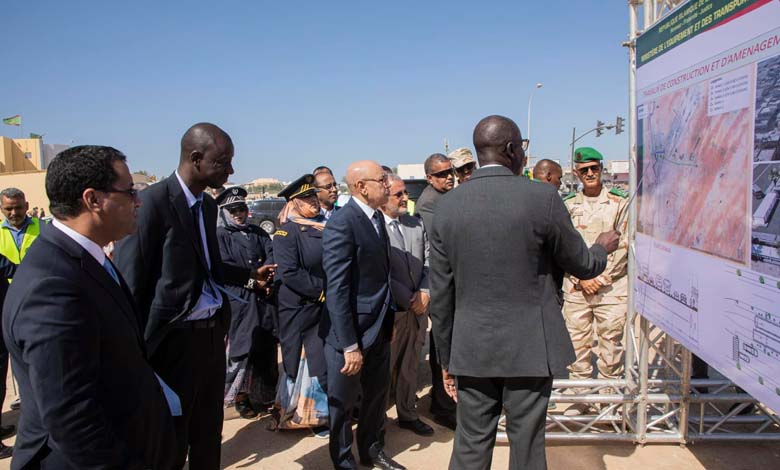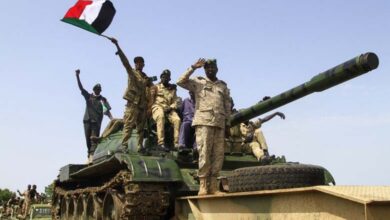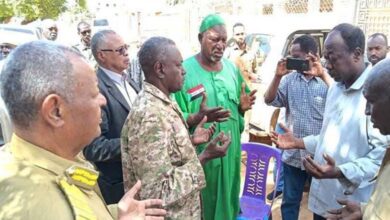With Emirati Support: Mauritanian President Lays Foundation Stone for River Water Transfer Project to Central States

The President of the Republic, Mohamed Ould El-Ghazaouani, laid the foundation stone, marking the start of the multi-purpose water transfer project from the river bank to 165 towns in three regions: Brakna, Tagant, and Assaba.
This project, with a total cost of 60 billion old ouguiyas, is funded by a grant from the United Arab Emirates. It will provide drinking water to approximately 115,000 inhabitants living in the dry areas of central Mauritania. The project also includes components to provide irrigation water to an area of 3,500 hectares, in areas located 10 kilometers from the city of Boghé.
The project, with a construction duration of 48 months, includes:
– A water intake from the river, producing 8,000 cubic meters of water.
– Construction of an integrated pumping station capable of pumping up to 8,000 cubic meters per hour.
– Laying a pipeline 105 kilometers long and 600 millimeters in diameter for water transport.
– Construction of a semi-underground water tank with a capacity of 5,000 cubic meters.
– Completion of a pumping station with a capacity of 4,320 cubic meters per hour.
– Laying a pipeline 65 kilometers long and 400 millimeters in diameter for water transport.
– Construction of a semi-underground water tank with a capacity of 2,500 cubic meters.
– A pumping station with a capacity of 12,600 cubic meters per hour, capable of pumping to a height of approximately 40 meters.
– Laying a pipeline 9 kilometers long and 1,800 millimeters in diameter for water transport.
– Construction of a semi-underground water tank with a capacity of 27,000 cubic meters, capable of covering 3,500 hectares.
In his speech on this occasion, the Minister of Water and Sanitation, Ismaël Ould Abdel Fattah, emphasized the importance of this development project, which will significantly contribute to ending the water shortage in the targeted villages located in a dry basin characterized by scarce groundwater.
He added that this project constitutes a radical solution to the suffering of a population of around 115,000 inhabitants, providing them with drinking water directly from the river. He highlighted that this project is part of the new sectoral strategy aimed at preserving groundwater as much as possible as a strategic reserve and maximizing the use of surface water.
He stated that this project adds to other important and structural projects that the water and sanitation sector is working to launch, including a series of important plans that will ensure sufficient drinking water for many cities in the country.
He expressed gratitude to the United Arab Emirates for their generous and outstanding support to our country in all areas.
As for the Minister of Agriculture, Mohamed Lemine Ould Beibac, in his speech on this occasion, he explained that the completion of this vital and pioneering project is part of the development projects witnessed by the country, which will mobilize all resources to serve citizens, especially farmers, to achieve development and strive for self-sufficiency in agricultural products, and improve their competitiveness.
He added that this important project will contribute to changing the lives of citizens and the future of this region in general for the better, due to the services and important developmental opportunities it will provide.
He reviewed the project’s components, its areas of intervention, and its role in enhancing local development and improving the quality of life of residents in various municipalities along its route.
On his part, the President of the Regional Council of Brakna, Mustapha Ould Mohamed Mahmoud, presented the achievements made over the past four years in the Brakna region, noting that among these achievements are significant projects in the field of water.
He stated that this project, given the number of villages and rural areas benefiting from it, is a major strategic project that constitutes a radical solution to eradicate thirst for the inhabitants of the areas located along its route.
Mayor Moussa Hamadi Sey of Hayar Ambar Municipality had earlier explained in a speech that this day is a historic one for all municipalities benefiting from this important project, which will solve the problem of the shortage of drinking water faced by vast areas of the Brakna region.
He added that this project is part of a series of important achievements witnessed by various regions of the country, including the establishment of the public school, the care for vulnerable social groups, and the opportunity provided to citizens who have not benefited from registration in the national population registry, through the recent census.
He presented a number of demands on behalf of the residents of Bababe District, including linking the municipalities of the district together with the road network and constructing a health center in the capital of Hayar Ambar Municipality.
Within the framework of this project – which will provide drinking water to 165 villages distributed among the mentioned states and bring sufficient water quantities for irrigating 3,500 hectares, the following will be accomplished: a water intake point at the river with a production capacity of 14,400 cubic meters per hour, equivalent to 345,000 cubic meters per day, the construction of a water filtration station with a production capacity of 8,000 cubic meters per hour, an integrated pumping station with a capacity of 8,000 cubic meters per hour, laying a pipeline 105 kilometers long and 600 millimeters in diameter, and building a semi-underground water tank with a capacity of 5,000 cubic meters.
The project components – expected to be completed within four years, also include the construction of a pumping station with a capacity of 4,320 cubic meters per hour, laying a pipeline 65 kilometers long and 400 millimeters in diameter, building a semi-underground water tank with a capacity of 2,500 cubic meters, and establishing a pumping station with a capacity of 12,600 cubic meters per hour capable of pumping at a height of 40 meters.
These components also include laying a pipeline 9 kilometers long and 1,800 millimeters in diameter, and building a semi-underground water tank with a capacity of 27,000 cubic meters to provide the necessary water for irrigating 3,500 hectares.
The cornerstone laying ceremony was attended by the Minister in charge of the Office of the President, several government officials, the Governor of Brakna, the Commander of the Seventh Military Region, the Ambassador of the United Arab Emirates, elected officials, intellectuals, and dignitaries of Brakna, as well as the leaders of some political formations.












